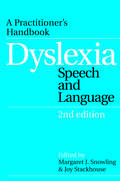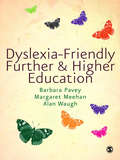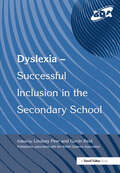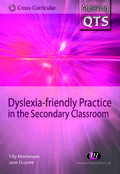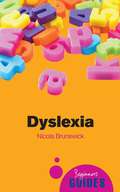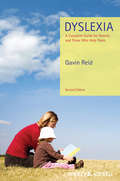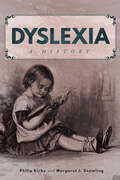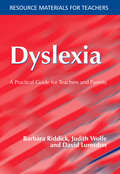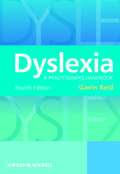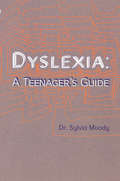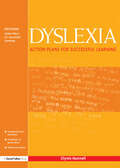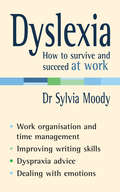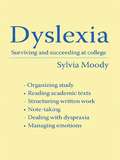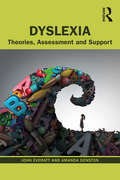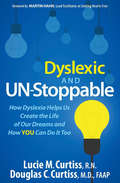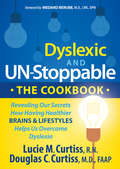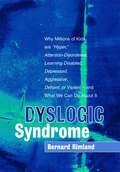- Table View
- List View
Dyslexia, Speech and Language
by Margaret J. Snowling Joy StackhouseThis authoritative handbook presents current ideas on the relationship between spoken and written language difficulties. It provides clinical and educational perspectives on the assessment and management of children's reading and spelling problems. The book begins with a theoretical overview.The second edition continues the theme of linking theory and practice. It is aimed at practitioners in the fields of education, speech and language therapy, and psychology. All original chapters have been updated and new chapters are added to reflect current developments.
Dyslexia-Friendly Further and Higher Education
by Barbara Pavey Margaret Meehan Alan WaughWritten by authors with extensive experience of working with students with dyslexia, this book provides clear guidance and practical strategies for dyslexia-friendly practice for those working with young people aged 14 to 19 and adults in education or work-based training. Looking at how dyslexia impacts on learning, the authors suggest ways to improve the learning environment and explain how to help students develop the basic skills that will help them to make the transition from study to employment. Building on the latest research and understanding of dyslexia, they also consider overlapping characteristics, emotional and social issues and funding. The book includes: - visual chapter summaries - case studies drawn from practice - ideas for dyslexia-friendly written work, and lab and bench work - international perspectives - a selection of resources - model lesson plans and useful checklists This is essential reading not only for those studying dyslexia-focused programmes at Master's level, but also for mainstream practitioners wishing to improve their dyslexia knowledge and practice, and an ideal resource for professionals working in a school, college, university or adult setting, or delivering training and consultancy in this field. Barbara Pavey is a Senior Lecturer in Education at York St John University. Margaret Meehan is the Dyslexia Coordinator at Swansea University. Alan Waugh is Programme Area Manager for Additional Support at City College, Coventry.
Dyslexia-Successful Inclusion in the Secondary School
by David BlunkettIncreasingly dyslexia is becoming a whole-school issue. The responsibility for addressing the needs of dyslexic students no longer rests with one individual but is the responsibility of all school staff - subject specialists and school management. This timely book addresses this need by providing specific guidance to secondary school staff on how to support dyslexic students within different subject areas and within the principles and practices of inclusion.
Dyslexia-friendly Practice in the Secondary Classroom (Achieving QTS Cross-Curricular Strand Series)
by Tilly Mortimore Jane DupreeThe first guide of its kind written specifically for trainee and newly qualified teachers, this standards-based text explores the needs of dyslexic learners in mainstream secondary schools. In light of the current dyslexia-friendly schools initiative, it looks at organisational-level support for dyslexic children, together with pragmatic strategies which teachers can use to support children′s cross-curricular learning. Further, it includes case studies and practical tasks to build readers′ confidence in supporting Specific Learning Difficulties, as well as a range of coping strategies and practical advice, based upon the authors′ experience of working with dyslexic learners in different contexts over many years.
Dyslexia: A Beginner's Guide (Beginner's Guides)
by Nicola BrunswickWinston Churchill, Andy Warhol, Walt Disney, Tom Cruise, Agatha Christie, Pablo Picasso. All famous and successful in their chosen professions. All dyslexic. Around 5 to 15% of speakers of alphabetic languages (e.g. English, French and Spanish) are dyslexic. But what is dyslexia? Are there different types of dyslexia? Is there a cure? What resources are available to help dyslexic children and adults? Nicola Brunswick answers these, and other, questions informed by current thinking and cutting-edge research. Dr Nicola Brunswick is a Senior Lecturer in Psychology at Middlesex University, UK.
Dyslexia: A Complete Guide for Parents and Those Who Help Them (Nasen Spotlight Ser.)
by Gavin ReidThe new edition of Dyslexia is written for parents of dyslexic children and the professionals who work with them, and provides information on the role parents can play in supporting their dyslexic child. This updated edition contains new material and up-to-date discussions of current research and programs. Empowers parents by providing them with strategies for dealing with a wide range of concerns including dyspraxia and dyscalculia New sections cover post-school issues, the emotional needs of young people with dyslexia and information on how parents can help at home Features information on some of the more popular interventions for dyslexia, and critical evaluations of ‘alternative treatments’ Includes first–hand accounts of parents’ hopes, successes and setbacks, and extensive lists of organizations and resources
Dyslexia: A History
by Margaret J. Snowling Philip KirbyIn 1896 the British physician William Pringle Morgan published an account of “Percy,” a “bright and intelligent boy, quick at games, and in no way inferior to others of his age.” Yet, in spite of his intelligence, Percy had great difficulty learning to read. Percy was one of the first children to be described as having word-blindness, better known today as dyslexia. In this first comprehensive history of dyslexia Philip Kirby and Margaret Snowling chart a journey that begins with Victorian medicine and continues to dyslexia’s current status as the most globally recognized specific learning difficulty. In an engaging narrative style, Kirby and Snowling tell the story of dyslexia, examining its origins and revealing the many scientists, teachers, and campaigners who put it on the map. Through this history they explain current debates over the diagnosis of dyslexia and its impact on learning.For those who have lived experience of dyslexia, professionals who have supported them, and scholars of social history, education, psychology, and childhood studies, Dyslexia reflects on the place of literacy in society – whom it has benefited, and whom it has left behind.
Dyslexia: A Practical Guide for Teachers and Parents (Nasen Spotlight Ser.)
by Judith Wolfe Barbara Riddick David LumsdonThis book focuses on realistic strategies for non-specialists to use when working with pupils who have dyslexia. It offers detailed, practical guidance on defining and identifying dyslexia, dyslexia in the early and middle years and at secondary school, and worked examples of IEPs. It also discusses providing effective support for the literacy and numeracy hours, raising self-esteem, and working with parents and voluntary organizations. In addition, the authors cover using checklists and assessments, choosing suitable programs and resources, and useful addresses and books. Teachers and teaching assistants in mainstream classrooms and parents wanting to help their children will find this book invaluable.
Dyslexia: A Practitioner's Handbook (Nasen Spotlight Ser.)
by Gavin ReidThe main purpose of this new edition is to incorporate the most recent theoretical and practical research in the field of dyslexia and literacy and present it in a user friendly format for Practitioners. It refers to the most recent government reports on literacy and dyslexia in a number of countries such as, USA, UK, Canada, New Zealand and Australia. Each chapter has a summary at the start and, at the end, key points and 'points to consider' are looked at.
Dyslexia: A Teenager's Guide
by Sylvia MoodyDyslexic teenagers face special problems - this book will help solve them. Dyslexia, involving problems with reading, writing, spelling, memory, organisation and time management, can affect people of all backgrounds and abilities. But most books on this subject are geared towards young children; advice for teenagers is thin on the ground. Yet dyslexic teenagers face special problems. They need to master complex study skills, deal with large amounts of revision, and cope with the demands of examinations. They may suffer from stress, anxiety and lack of confidence. Dyslexia: A Teenager's Guide helps young adults tackle these problems with strategies uniquely suited to their needs. Clearly and simply written by a leading expert in the field, the book helps with reading, writing, spelling and memory, as well as giving tips on how to take notes, organise study, deal with examinations and use IT. It also shows how to improve confidence, deal with stress, and build on the creative talent that many dyslexics possess.
Dyslexia: Action Plans for Successful Learning
by Glynis HannellA clearly explained guide to helping pupils cope with their dyslexia, this book dispels common myths and includes:* Comprehensive coverage of dyslexia -what it is and what causes it* Action plans to help pupils overcome their difficulties with reading, writing, spelling and maths* Advice on how pupils with dyslexia can boost their memory, concentra
Dyslexia: How to survive and succeed at work
by Sylvia MoodyDyslexic people face many problems in the workplace: difficulties with reading and writing, memory, organisation and time management, and a recent TUC report on dyslexia in the workplace estimates that 3 million people are affected.Dyslexia: How to survive and succeed at work is written by a leading expert in the field for people of all backgrounds and abilities and will help you to master complex organisational skills, deal with a large workload and cope with the demands of deadlines. It also shows how to improve confidence, deal with stress, and build on the creative talent that many dyslexics possess.Dyslexia: How to survive and succeed at work:- Explains what dyslexic and dyspraxic difficulties are- Describes how they affect workplace efficiency- Offers strategies to manage dyslexic difficulties and reduce their adverse effect on work efficiency- Provides information about ways in which employers can help dyslexic employees
Dyslexia: Surviving and Succeeding at College
by Sylvia MoodyDyslexia: Surviving and Succeeding at College is a practical and easy-to-read guide for dyslexic and dyspraxic students. Clearly and simply written, in a dyslexia-friendly format, it addresses not just study skills, but also more general aspects of coping with student life.Each chapter includes step-by-step strategies which can be put into practice from the very first day at college. You will learn how to develop effective study skills such as: reading strategies to improve your accuracy and comprehension skills how to make your note-taking efficient and useful for essay writing feeling confident in contributing to seminars memory strategies for study and everyday life how to organise your time and plan your work. Sylvia Moody recognises that adapting to student life generally is as important as developing study skills. Guidance is given to assist you in finding your way around campus, building relationships with tutors, managing emotional development and preparing for the world of work. Full of invaluable self-help strategies, this book will empower you to improve your skills in all areas. The book will also be useful to subject tutors who wish to learn about dyslexia, and to dyslexia tutors and co-ordinators who want to give practical advice to their students. Dr Sylvia Moody is a freelance writer and psychologist specialising in adult dyslexia.
Dyslexia: Theories, Assessment and Support
by John Everatt Amanda DenstonDyslexia: Theories, Assessment and Support offers a broad perspective on dyslexia, providing a range of views from theory to practice which help explain the continued controversy surrounding the condition. Offering a framework on which to understand the concept of dyslexia, the book considers procedures that can both identify the condition and help support those with it. With a focus on self-concept, the authors highlight ways to positively influence both literacy acquisition and individual well-being. This book is ideal reading for those taking courses on dyslexia or literacy learning difficulties within education, psychology and related disciplines. It will be of great interest to specialist teachers, special education staff, educational psychologists and those in related occupations.
Dyslexic and Un-Stoppable: How Dyslexia Helps Us Create the Life of Our Dreams and How You Can Do It Too
by Lucie M. Curtiss Douglas C. CurtissDoes your child have difficulty with reading? Is your child's teacher complaining about behavior or attention issues? Is writing a chore for your child? Could your child be dyslexic? You are in luck. "Dyslexic AND UN-Stoppable" is not just another book about dyslexia. It is uniquely designed for both the dyslexic and non-dyslexic reader. "Dyslexic AND UN-Stoppable" shows you how Lucie Curtiss, discovered her own dyslexia at age 25, developed tools and strategies to become a successful entrepreneur. She honed these tools as she helped her dyslexic son excel at school. She then enrolled her husband, Dr. Douglas Curtiss, a Yale-trained pediatrician, to contribute to this book. Together they show you how to implement these strategies in your life so that your dyslexic child can be UN-Stoppable. Youll find practical insights, real-life success stories, and online video tutorials to help your dyslexic child with reading, writing, spelling, math, and much more. And if you are dyslexic yourself, "Dyslexic and UN-Stoppable" will Inspire and Empower you to live the life of your dreams by: - Revealing the True Gifts dyslexia offers - Describing two real-life Success Stories from a mother and a son with dyslexia - Visually teaching you Tools and Strategies you can use every day - Helping you blast through the limitations of dyslexia by Discovering Your Niche - Showing you how to Navigate the School System step by step - Reinstilling your natural Love of Learning Another word for dyslexia is smart. So use these powerful strategies, discover your unique talents, and become UN-Stoppable!,
Dyslexic and Un-Stoppable: Revealing Our Secrets How Having Healthier Brains & Lifestyles Helps Us Overcome Dyslexia
by Lucie M. Curtiss Douglas C. Curtiss Medard BerubeDyslexic and Un-Stoppable The Cookbook: Revealing Our Secrets How Having Healthier Brains and Lifestyles Helps Us Overcome Dyslexia, shares nutritional facts and healthier recipes Lucie and Dr. Doug Curtiss have incorporated in their daily routine. Dyslexic and Un-Stoppable The Cookbook complements Dyslexic AND UN-Stoppable: How Dyslexia Helps Us Create the Life of Our Dreams and How YOU Can Do It Too!, by identifying healthy, beneficial ingredients to improve the odds of overcoming dyslexia. Lucie M. Curtiss, RN, and Dr. Douglas C. Curtiss, FAAP, are the cofounders of Dyslexic AND UN-Stoppable, LLC. Their mission is to empower dyslexic children to become UN-Stoppable and overcome dyslexia by rediscovering their inner power. They are here to remind dyslexics that they are SMART!
Dyslogic Syndrome: Why Millions of Kids are "Hyper," Attention-Disordered, Learning Disabled, Depressed, Aggressive, Defiant, or Violent - and What We Can Do About It
by Bernard RimlandDyslogical children are commonly labelled as having one or more of a mix of conditions that include Attention Deficit/Hyperactivity Disorder, Conduct Disorder, Bipolar Disorder and Oppositional Defiant Disorder. The number of children who could be described as dyslogical continues to rise sharply, and society has a tendency to lay the blame for this trend on poor parenting or bad schooling. In this ground-breaking book, Bernard Rimland argues that such `conventional wisdom' is not just mistaken but dangerous. Drawing on the latest research, Rimland outlines the impact of biological factors on today's children and exposes the influences of toxins and dietary deficiencies. Dyslogic Syndrome is full of valuable advice on the safe, effective treatments that are available to children, and offers positive strategies for helping parents and professionals to do the best for their dyslogical child.
